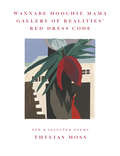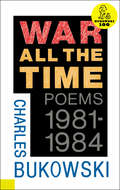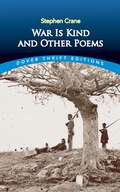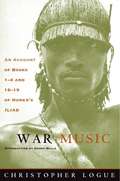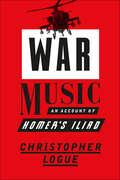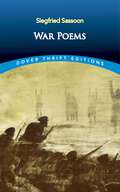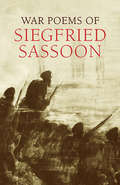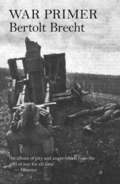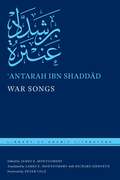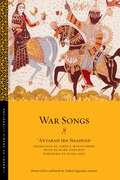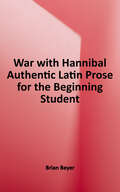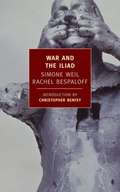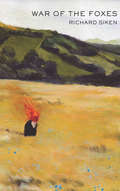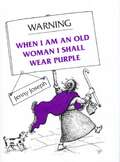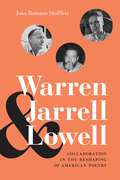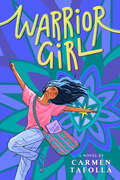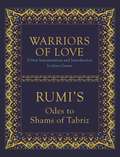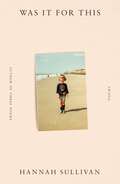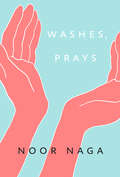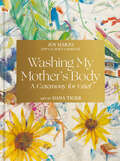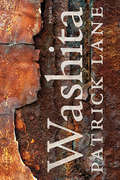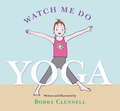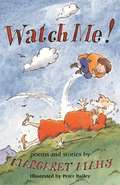- Table View
- List View
Wannabe Hoochie Mama Gallery of Realities' Red Dress Code: New and Selected Poems
by Thylias MossThis career-spanning volume by Thylias Moss, one of America's most revered literary innovators, conveys the dazzling spectrum of her hypnotic poetic output, written over the past thirty-five years and including selections from each previous book as well as previously unpublished new poems. A poet whose innovations have influenced generations of writers, Thylias Moss is a sort of taxonomist-preacher, whose profound meditation on American culture underlies and propels the dazzling lyrical and impassioned passages she writes in outraged response. This new volume gathers together substantial selections from her previous books and follows them with more than fifty pages of daring new work. Whether in early poems or more recent output, Moss make no promises of smooth sailing: even when they begin with beloved cultural icons (Robert Frost, Dr. Who, the Statue of Liberty), her poems spiral outward, insisting on new perspectives, truths, and realities--particularly of African American experience. For more than three decades, Moss has been a fearless re-inventor of poetry's possibilities. Her New & Selected is a momentous publication by "a visionary storyteller, a major figure in contemporary American poetry" (Charles Simic).
War All the Time, 1981-1984: Poems, 1981-1984 (Poems 1981-1984 Ser.)
by Charles BukowskiWar All the Time is a selection of poetry from the early 1980s. Charles Bukowski shows that he is still as pure as ever but he has evolved into a slightly happier man that has found some fame and love. These poems show how he grapples with his past and future colliding.
War And Love, Love And War: New And Selected Poems
by Peter Cole Aharon ShabtaiWar & Love, Love & War presents a poetic biography of one of Israel’s living literary masters, an artist whom the National Book Award–winner C. K. Williams has called “one of the most exciting poets writing anywhere, and certainly the most audacious.” The book moves from shockingly potent political poems to love lyrics that are as explosive and sometimes bawdy as they are tender; from early and stirring inventories of kibbutz life to a radically inventive midrash on (and paean to) the career and character of the Israeli right-wing leader Menachem Begin; from passion for justice to passion for a deeply mourned wife. At the end of it all is a prose ars poetica in which Shabtai discusses the method behind his marvelous madness. Peter Cole’s powerful translation displays the full and astonishing range of Aharon Shabtai’s oeuvre in a single volume for the first time in English.
War Is Kind and Other Poems (Dover Thrift Editions: Poetry Ser.)
by Stephen CraneA unique stylist and one of the most innovative and talented writers of his generation, Stephen Crane (1871-1900) won lasting fame as a novelist (The Red Badge of Courage, Maggie: A Girl of the Streets) and short story writer. Described by William Dean Howells as a writer whose genius seemed to "spring to life fully armed," Crane also produced impressive free-form verse. This excellent anthology contains nearly all of Crane's verse, including two complete books of poems: The Black Riders and Other Lines, which garnered immediate praise; and War Is Kind, ablaze with vivid imagery. Here, too, are rewarding selections from his uncollected poetic works. Thought by some critics to anticipate the Imagist movement of the twentieth century, Crane's poems are usually brief, cadenced, and rhymeless, rich in drama and symbolism, and spiritually penetrating.
War Music: An Account of Books 1-4 and 16-19 of Homer's Iliad
by Christopher LogueLogue retells some of the most evocative episodes of the Iliad, including the death of Patroclus and Achille's return to battle, that sealed the doom of Troy.
War Music: An Account of Homer's Iliad
by Christopher LogueA remarkable hybrid of translation, adaptation, and inventionPicture the east Aegean sea by night,And on a beach aslant its shimmering Upwards of 50,000 menAsleep like spoons beside their lethal Fleet. “Your life at every instant up for— / Gone. / And, candidly, who gives a toss? / Your heart beats strong. Your spirit grips,” writes Christopher Logue in his original version of Homer’s Iliad, the uncanny “translation of translations” that won ecstatic and unparalleled acclaim as “the best translation of Homer since Pope’s” (The New York Review of Books). Logue’s account of Homer’s Iliad is a radical reimagining and reconfiguration of Homer’s tale of warfare, human folly, and the power of the gods in language and verse that is emphatically modern and “possessed of a very terrible beauty” (Slate). Illness prevented him from bringing his version of the Iliad to completion, but enough survives in notebooks and letters to assemble a compilation that includes the previously published volumes War Music, Kings, The Husbands, All Day Permanent Red, and Cold Calls, along with previously unpublished material, in one final illuminating volume arranged by his friend and fellow poet Christopher Reid. The result, War Music, comes as near as possible to representing the poet’s complete vision and confirms what his admirers have long known: that “Logue’s Homer is likely to endure as one of the great long poems of the twentieth century” (The Times Literary Supplement).
War Poems (Dover Thrift Editions)
by Siegfried SassoonAt the dawn of World War I, Siegfried Sassoon exchanged his pursuits of cricket, fox-hunting, and romantic verse for army life amid the muddy trenches of France. The first English soldier-poet to achieve notoriety as an opponent of the war, he ranks among the conflict's most critical poetic voices. This collection of his epigrammatic and satirical poetry conveys the shocking brutality and pointlessness of the Great War. <P><P> Many of these poems were written in the hospital while Sassoon recovered from wounds he received in battle. Their violence and graphic detail shocked readers, impressing upon them the horrors of trench warfare and the foot soldier's weariness of the never-ending struggle. "The dynamic quality of his war poems," observed the Times Literary Supplement, "was due to the intensity of feeling which underlay their cynicism." More than 80 of Sassoon's moving works are featured in this volume, including "Counter-Attack," "They," "The General," and "Base Details."
War Poems of Siegfried Sassoon (Faber Pocket Poetry Ser.)
by Siegfried SassoonAt the dawn of World War I, poet Sassoon exchanged his pastoral pursuits of cricket, fox-hunting, and romantic verse for army life amid the muddy trenches of France. This collection of his epigrammatic and satirical poetry conveys the shocking brutality and pointlessness of the Great War and includes "Counter-Attack," "'They," "The General," and "Base Details."
War Primer
by Bertolt Brecht John WillettA terrifying series of short poems by one of the world’s leading playwrights, set to images of World War IIIn this singular book written during World War Two, Bertolt Brecht presents a devastating visual and lyrical attack on war under modern capitalism. He takes photographs from newspapers and popular magazines, and adds short lapidary verses to each in a unique attempt to understand the truth of war using mass media. Pictures of catastrophic bombings, propaganda portraits of leading Nazis, scenes of unbearable tragedy on the battlefield — all these images contribute to an anthology of horror, from which Brecht’s perceptions are distilled in poems that are razor-sharp, angry and direct. The result is an outstanding literary memorial to World War Two and one of the most spontaneous, revealing and moving of Brecht’s works.
War Songs (Library of Arabic Literature #11)
by ʿAntarah ibn ShaddādPoems of love and battle by Arabia’s legendary warrior From the sixth-century highlands of Najd in the Arabian peninsula, on the eve of the advent of Islam, come the strident cries of a legendary warrior and poet. The black outcast son of an Arab father and an Ethiopian slave mother, 'Antarah ibn Shaddad struggled to win the recognition of his father and tribe. He defied social norms and, despite his outcast status, loyally defended his people. 'Antarah captured his tumultuous life in uncompromising poetry that combines flashes of tenderness with blood-curdling violence. His war songs are testaments to his life-long battle to win the recognition of his people and the hand of 'Ablah, the free-born woman he loved but who was denied him by her family. War Songs presents the poetry attributed to 'Antarah and includes a selection of poems taken from the later Epic of 'Antar, a popular story-cycle that continues to captivate and charm Arab audiences to this day with tales of its hero’s titanic feats of strength and endurance. 'Antarah’s voice resonates here, for the first time in vibrant, contemporary English, intoning its eternal truths: commitment to one’s beliefs, loyalty to kith and kin, and fidelity in love.A bilingual Arabic-English edition.
War Songs (Library of Arabic Literature #41)
by Peter Cole Richard Sieburth James E Montgomery 'Antarah ibn ShaddadPoems of love and battle by Arabia’s legendary warrior From the sixth-century highlands of Najd in the Arabian peninsula, on the eve of the advent of Islam, come the strident cries of a legendary warrior and poet. The black outcast son of an Arab father and an Ethiopian slave mother, 'Antarah ibn Shaddad struggled to win the recognition of his father and tribe. He defied social norms and, despite his outcast status, loyally defended his people. 'Antarah captured his tumultuous life in uncompromising poetry that combines flashes of tenderness with blood-curdling violence. His war songs are testaments to his life-long battle to win the recognition of his people and the hand of 'Ablah, the free-born woman he loved but who was denied him by her family. War Songs presents the poetry attributed to 'Antarah and includes a selection of poems taken from the later Epic of 'Antar, a popular story-cycle that continues to captivate and charm Arab audiences to this day with tales of its hero’s titanic feats of strength and endurance. 'Antarah’s voice resonates here, for the first time in vibrant, contemporary English, intoning its eternal truths: commitment to one’s beliefs, loyalty to kith and kin, and fidelity in love.An English-only edition.
War With Hannibal: Authentic Latin Prose for the Beginning Student
by Brian BeyerThis edition of Book III of Eutropius's Breviarium ab urbe condita is designed to be a student's first encounter with authentic, unabridged Latin prose. Written in a simple and direct style, the Breviarium covers the period of Roman history that students find the most interesting—the Second Punic War fought against Carthage—and the original Latin text is supplemented with considerable learning support. Full annotations on every page, detailed commentary on grammar and syntax, and a glossary designed specifically for the text allow students to build both their confidence and their reading skills. <p><p>The commentary in the back of the book is cross-referenced to the following commonly used textbooks: <p>• Wheelock's Latin, 6th Edition <p>• Latin: An Intensive Course by Moreland and Fleischer <p>• Ecce Romani II, 3rd Edition - Latin for Americans, Level 2 <p>• Jenney's Second Year Latin <p>• Allen and Greenough's New Latin Grammar <p><p>Macrons have been added to the entire text in accordance with the vowel quantities used in the Oxford Latin Dictionary. Additional resources include an unannotated version of the text for classroom use, supplementary passages in English from other ancient authors, and appendixes with a timeline of events and maps and battle plans. <p><p>The text may be used in secondary schools and colleges as early as the first year of study. The copious translation help, notes, and cross-references also make it ideal for independent learners.
War and the Illiad
by Simone Weil Rachel BespaloffFirst published on the eve of war in 1939, the essay has often been read as a pacifist manifesto. Rachel Bespaloff was a French contemporary of Weil's whose work similarly explored the complex relations between literature, religion, and philosophy. This edition brings together these two influential essays for the first time, accompanied by Benfey's scholarly introduction and an afterword by the great Austrian novelist Hermann Broch.
War of the Foxes
by Richard Siken"His territory is [where] passion and eloquence collide and fuse.'--The New York Times"Richard Siken writes about love, desire, violence, and eroticism with a cinematic brilliance and urgency."--Huffington PostRichard Siken's debut, Crush, won the Yale Younger Poets' Prize, sold over 20,000 copies, and earned him a devoted fan-base. In this much-anticipated second book, Richard Siken seeks definite answers to indefinite questions: what it means to be called to make--whether it is a self, love, war, or art--and what it means to answer that call. In poems equal parts contradiction and clarity, logic and dream, Siken tells the modern world an unforgettable fable about itself.The MuseumTwo lovers went to the museum and wandered the rooms.He saw a painting and stood in front of itfor too long. It was a few minutes before sherealized he had gotten stuck. He was stuck lookingat a painting. She stood next to him, looking at hisface and then the face in the painting. What do yousee? she asked. I don't know, he said. He didn'tknow. She was disappointed, then bored. He waslooking at a face and she was looking at her watch.This is where everything changed . . . Richard Siken is a poet, painter, and filmmaker. His first book, Crush, won the Yale Younger Poets' prize. He lives in Tucson, Arizona.
Warning: When I am an old woman I shall wear purple
by Jenny JosephIn this charming poem, a repectible middle-aged woman imagines what it would be like to by a crabby, dotty, old woman doing what she pleases.
Warren, Jarrell, and Lowell: Collaboration in the Reshaping of American Poetry
by Joan Romano ShifflettRobert Penn Warren, Randall Jarrell, and Robert Lowell maintained lifelong, well-documented friendships with one another, often discussing each other’s work in private correspondence and published reviews. Joan Romano Shifflett’s Warren, Jarrell, and Lowell: Collaboration in the Reshaping of American Poetry traces the artistic and personal connections between the three writers. Her study uncovers the significance of their parallel literary development and reevaluates dominant views of how American poetry evolved during the mid-twentieth century. Familiar accounts of literary history, most prominently the celebration of Lowell’s Life Studies as a revolutionary breakthrough into confessional poetry, have obscured the significance of the deep connections that Lowell shared with Warren and Jarrell. They all became quite close in the 1930s, with the content and style of their early poetry revealing the impact of their mentors John Crowe Ransom and Allen Tate, whose aesthetics the three would ultimately modify and transform. The three poets achieved professional maturity and success in the 1940s, during which time they relied on one another’s honest critiques as they experimented with changes in subject matter and modes of expression. Shifflett shows that their works of the late 1940s were heavily influenced by Robert Frost. This period found Warren, Jarrell, and Lowell infusing ostensibly simple verse with multifaceted layers of meaning, capturing the language of speech in diction and rhythm, and striving to raise human experience to a universal level. During the 1950s, the three poets became public figures, producing major works that addressed the nation’s postwar need to reconnect with humanity. Warren, Jarrell, and Lowell continued to respond in interlocking ways throughout the 1960s, with each writer using innovative stylistic techniques to create a colloquy with readers that directed attention away from superficial matters and toward the important work of self-reflection. Drawing from biographical materials and correspondence, along with detailed readings of many poems, Warren, Jarrell, and Lowell offers a compelling new perspective on the shaping of twentieth-century American poetry.
Warrior Girl
by Carmen TafollaAn insightful novel in verse about the joys and struggles of a Chicana girl who is a warrior for her name, her history, and her right to choose what she celebrates in life.Celina and her family are bilingual and follow both Mexican and American traditions. Celina revels in her Mexican heritage, but once she starts school it feels like the world wants her to erase that part of her identity. Fortunately, she&’s got an army of family and three fabulous new friends behind her to fight the ignorance. But it&’s her Gramma who&’s her biggest inspiration, encouraging Celina to build a shield of joy around herself. Because when you&’re celebrating, when you find a reason to sing or dance or paint or play or laugh or write, they haven&’t taken everything away from you. Of course, it&’s not possible to stay in celebration mode when things get dire--like when her dad&’s deported and a pandemic hits--but if there is anything Celina&’s sure of, it&’s that she&’ll always live up to her last name: Guerrera--woman warrior--and that she will use her voice and writing talents to make the world a more beautiful place where all cultures are celebrated.
Warriors of Love: Rumi's Odes to Shams of Tabriz
by James Cowan Mevlana RumiIn 1244 a man wrapped in a coarse black coat entered Konya and so into the life of Islam’s most celebrated poet and mystic: Mevlana Jalaluddin Rumi. A wanderer and spiritual vagabond, Shams of Tabriz proceeded to wrestle with Rumi’s soul. What he wanted from his protégé was for him to embody a wilder, more robust spirituality that would enable him to embrace life’s rawness more completely than any saint had done in the past.Warriors of Love is a fresh interpretation of a selection of 49 poems which were written by Rumi as metaphors for his love for God as well as for his friend Shams, the Wild One. In a long introduction on the life and times of Rumi and his friendship with Shams James Cowan also explores the historical facts of their encounter, Sufism, the Mevlevi Order of Dervishes, the new dimension that Shams brought to Islamic spirituality and the importance of friendship as a true path to God.
Was It for This: Poems
by Hannah SullivanA hybrid new collection from the author of Three Poems—about London, terror, new motherhood, the Grenfell Tower fire, and how we live now.Hannah Sullivan’s first collection, Three Poems, won the T. S. Eliot Prize and the inaugural John Pollard International Poetry Prize. Was It for This continues that book’s project, offering a trenchant exploration of the ways in which we attempt to map our lives in space and time.But there is also the wider, collective experience to contend with, the upheaval of historic event and present disaster. “Tenants,” the first poem, is an elegy for Grenfell, written from the uneasy perspective of a new mother living a few streets away. Elsewhere, from the terraces and precincts of seventies and eighties London to the late-at-night decks of American suburbs, intimately inhabited geographies provide reference points and sites for revisiting.Nothing is too small or unlovely to be transfixed by the poet’s attention, from the thin concrete pillars of a flyover to an elderly peacock’s broken train. There is a memorializing strain in the forensic accumulation of detail, but there is also celebration, a keen sense of holding on to and cherishing what we can.
Washes, Prays
by Noor NagaRBC Bronwen Wallace Award winner Noor Naga's bracing debut, a novel-in-verse about a young woman's romantic relationship with a married man and her ensuing crisis of faith.2021 Arab American Book Award - George Ellenbogen Poetry Award, WinnerPat Lowther Memorial Award, WinnerGerald Lampert Memorial Award, LonglistFred Cogswell Award For Excellence In Poetry, Second Place WinnerCBC Best Canadian Poetry of 2020Coocoo is a young immigrant woman in Toronto. Her faith is worn threadbare after years of bargaining with God to end her loneliness and receiving no answer. Then she meets her mirror-image; Muhammad is a professor and father of two. He's also married. Heartbreaking and hilarious, this verse-novel chronicles Coocoo's spiraling descent: the transformation of her love into something at first desperate and obsessive, then finally cringing and animal, utterly without grace. Her best friend, Nouf, remains by her side throughout, and together they face the growing contradictions of Coocoo's life. What does it mean to pray while giving your body to a man who cannot keep it? How long can a homeless love survive on the streets? These are some of the questions this verse-novel swishes around in its mouth.
Washing My Mother's Body: A Ceremony for Grief
by Joy HarjoA beautifully illustrated edition of Poet Laureate Joy Harjo&’s poem &“Washing My Mother&’s Body,&” which offers a way through grief when the loss appears unbearable.As I wash my mother&’s face, I tell herhow beautiful she is, how brave, how her beauty and braverylive on in her grandchildren. Her face is relaxed, peaceful.Her earth memory body has not left yet,but when I see her the next day, embalmed and in the casketin the funeral home, it will be gone.Where does it go?Through lyrical prose and evocative watercolor illustrations by award-winning Muscogee artist Dana Tiger, Washing My Mother&’s Body explores the complexity of a daughter&’s grief as she reflects on the joys and sorrows of her mother&’s life. She lays her mother to rest in the landscape of her memory, honoring the hands that raised her, the body that protected her, and the legs that carried her mother through adversity.Moving, comforting, and deeply emotional, Washing My Mother&’s Body is a tender look at mother-daughter relationships, the complexity of grieving the loss of a parent, and the enduring love of those left behind.
Washita
by Patrick LaneFollowing the success of his award-winning memoir There is a Season (2004) and his bestselling novel Red Dog, Red Dog (2008), Patrick Lane felt his celebrated poetry career might be at an end and published his Collected Poems in 2011. But the process of revisiting his collected poetic works rekindled his first love and launched him on a new phase of poetry composition that resulted in this impressive and distinctive new book.Honest and self-aware, Washita evokes some of the most inexpressible experiences a human being can undergo: the loss of a parent, the breakdown of a body, the perversion of nature, the acquiring of wisdom. In "Hard-Rock," a boy begins to understand that his father will die: "His lungs created elaborate cathedrals from quartz dust, / a crystal symphony playing Mahler under water." In "Submission," a speaker struggles with losing his sight, capable only of expressing himself through metaphor. But amid this darkness sparks an awareness of the artistry of the world: "Vete a la mierda, hijo de puta! / Hate is beautiful in Spanish."As might be expected from a seventy-five-year-old poet, Washita is reflective in tone, exploring all facets of the poet's own life as well as those others his has touched. Introducing a new style employing medium-length, end-stopped lines, terse diction and concrete imagery, Washita has a solidity and mastery that marks it as a new highlight in Lane's distinguished career.
Watch Me Do Yoga
by Bobby ClennellWatch Me Do Yoga is narrated by a child's voice as she goes through a series of yoga poses. We see her practicing with her dad, her mom, or the family dog, and sometimes alone on her mat. We see her in the garden, on the patio, in her bedroom, even sitting on a gigantic lotus. But no matter what the setting, she relates her yoga to the natural world. She stands like a tree or a mountain and imitates the actions of animals -- a fish, a dog, a lion, and a tortoise. She celebrates her connection with the life around her and wants just a bit of attention in return. The upbeat text and appealing illustrations should encourage young children to practice yoga and their parents to practice with them.
Watch Me Do Yoga
by Bobby ClennellWatch Me Do Yoga is narrated by a child's voice as she goes through a series of yoga poses. We see her practicing with her dad, her mom, or the family dog, and sometimes alone on her mat. We see her in the garden, on the patio, in her bedroom, even sitting on a gigantic lotus. But no matter what the setting, she relates her yoga to the natural world. She stands like a tree or a mountain and imitates the actions of animals -- a fish, a dog, a lion, and a tortoise. She celebrates her connection with the life around her and wants just a bit of attention in return. The upbeat text and appealing illustrations should encourage young children to practice yoga and their parents to practice with them.
Watch Me!
by Margaret MahyLike its companion volumes WONDERFUL ME! And WAIT FOR ME!, these stories and poems are alive with the sort of magic and fun that children's dreams are made of. In these pages you will meet Aunt Nasty the witch, the boy who bounced, a few magicians, a ghostly girl, a princess who marries a clown and endless other surprises. Originally published as The Third Margaret Mahy Storybook, and newly illustrated by Peter Bailey, these tales remain as well-loved now as ever.
